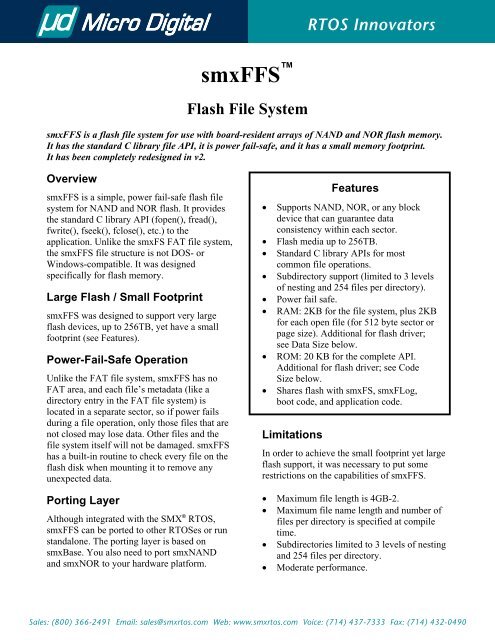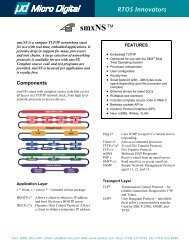Create successful ePaper yourself
Turn your PDF publications into a flip-book with our unique Google optimized e-Paper software.
<strong>RTOS</strong> Innovators<br />
<strong>smxFFS</strong> <br />
<strong>Flash</strong> <strong>File</strong> <strong>System</strong><br />
<strong>smxFFS</strong> is a flash file system for use with board-resident arrays of NAND and NOR flash memory.<br />
It has the standard C library file API, it is power fail-safe, and it has a small memory footprint.<br />
It has been completely redesigned in v2.<br />
Overview<br />
<strong>smxFFS</strong> is a simple, power fail-safe flash file<br />
system for NAND and NOR flash. It provides<br />
the standard C library API (fopen(), fread(),<br />
fwrite(), fseek(), fclose(), etc.) to the<br />
application. Unlike the smxFS FAT file system,<br />
the <strong>smxFFS</strong> file structure is not DOS- or<br />
Windows-compatible. It was designed<br />
specifically for flash memory.<br />
Large <strong>Flash</strong> / Small Footprint<br />
<strong>smxFFS</strong> was designed to support very large<br />
flash devices, up to 256TB, yet have a small<br />
footprint (see Features).<br />
Power-Fail-Safe Operation<br />
Unlike the FAT file system, <strong>smxFFS</strong> has no<br />
FAT area, and each file’s metadata (like a<br />
directory entry in the FAT file system) is<br />
located in a separate sector, so if power fails<br />
during a file operation, only those files that are<br />
not closed may lose data. Other files and the<br />
file system itself will not be damaged. <strong>smxFFS</strong><br />
has a built-in routine to check every file on the<br />
flash disk when mounting it to remove any<br />
unexpected data.<br />
Porting Layer<br />
Although integrated with the SMX ® <strong>RTOS</strong>,<br />
<strong>smxFFS</strong> can be ported to other <strong>RTOS</strong>es or run<br />
standalone. The porting layer is based on<br />
smxBase. You also need to port smxNAND<br />
and smxNOR to your hardware platform.<br />
Features<br />
• Supports NAND, NOR, or any block<br />
device that can guarantee data<br />
consistency within each sector.<br />
• <strong>Flash</strong> media up to 256TB.<br />
• Standard C library APIs for most<br />
common file operations.<br />
• Subdirectory support (limited to 3 levels<br />
of nesting and 254 files per directory).<br />
• Power fail safe.<br />
• RAM: 2KB for the file system, plus 2KB<br />
for each open file (for 512 byte sector or<br />
page size). Additional for flash driver;<br />
see Data Size below.<br />
• ROM: 20 KB for the complete API.<br />
Additional for flash driver; see Code<br />
Size below.<br />
• Shares flash with smxFS, smxFLog,<br />
boot code, and application code.<br />
Limitations<br />
In order to achieve the small footprint yet large<br />
flash support, it was necessary to put some<br />
restrictions on the capabilities of <strong>smxFFS</strong>.<br />
• Maximum file length is 4GB-2.<br />
• Maximum file name length and number of<br />
files per directory is specified at compile<br />
time.<br />
• Subdirectories limited to 3 levels of nesting<br />
and 254 files per directory.<br />
• Moderate performance.<br />
Sales: (800) 366-2491 Email: sales@smxrtos.com Web: www.smxrtos.com Voice: (714) 437-7333 Fax: (714) 432-0490
<strong>smxFFS</strong> API<br />
sff_init ()<br />
sff_exit ()<br />
sff_devreg (dev_if, id)<br />
sff_devunreg (id)<br />
sff_fopen (filename, mode)<br />
sff_fclose (filehandle)<br />
sff_fread (buf, size, items, filehandle)<br />
sff_fwrite (buf, size, items, filehandle)<br />
sff_fseek (filehandle, offset, method)<br />
sff_fdelete (filename)<br />
sff_rename (oldname, newname)<br />
sff_timestamp (filename, datetime)<br />
sff_filelength (filename)<br />
sff_rewind (filehandle)<br />
sff_fflush (filehandle)<br />
sff_ftell (filehandle)<br />
sff_truncate (filehandle)<br />
sff_feof (filehandle)<br />
sff_findfile (filename)<br />
sff_findfirst (filespec, fileinfo)<br />
sff_findnext (id, fileinfo)<br />
sff_findclose (fileinfo)<br />
sff_mkdir (path)<br />
sff_rmdir (path)<br />
sff_chkdsk (id)<br />
sff_format (id)<br />
sff_freekb (id)<br />
sff_totalkb (id)<br />
sff_clustersize (id)<br />
Initialize the file system.<br />
Uninitialize the file system.<br />
Register a device driver to the system.<br />
Un-Register a device driver from the system.<br />
Open a file for read/write access.<br />
Close an open file and flush all data to the storage media.<br />
Read data from an open file.<br />
Write data to an open file.<br />
Move the file pointer to the specified location.<br />
Delete a file.<br />
Rename a file or directory.<br />
Set a file’s modification timestamp.<br />
Return the length of a file, in bytes.<br />
Move the file pointer to the beginning of the file.<br />
Flush all data associated with the file handle to the storage media.<br />
Determine the current file pointer position.<br />
Truncate a file at the current file pointer.<br />
Test for end-of-file.<br />
Test if a file exists.<br />
Provide information about the first instance of a file whose name<br />
matches the name specified by the filespec argument.<br />
Find the next file, if any, whose name matches the filespec argument in a<br />
previous call to sfs_findfirst(), and return info about it in fileinfo structure.<br />
Clean up after the findfirst/findnext operation.<br />
Create a new directory.<br />
Remove a directory.<br />
Check and fix disk problems.<br />
Format the storage media.<br />
Return the number of free KB on the storage media.<br />
Return the number of total KB on the storage media.<br />
Return the data cluster size.<br />
2
Size and Performance<br />
Code Size<br />
Code size varies depending upon the CPU, compiler, and optimization level. Below is an example.<br />
CPU and Compiler <strong>smxFFS</strong> smxNAND smxNOR<br />
ARM & IAR 6.10 20 KB 14 KB 5 KB<br />
Data Size<br />
Data size only depends upon the flash sector size and number of open files. smxNAND data size increases with<br />
flash size. 13KB for 256MB flash disk; 37KB for 1GB flash disk. See the smxNAND datasheet for more size<br />
information. smxNOR data size is not affected by flash size.<br />
Sector Size and Open <strong>File</strong>s <strong>smxFFS</strong> smxNAND smxNOR<br />
512 byte sector size, one open file 4 KB 13 KB 1.5 KB<br />
2048 byte sector size, one open file 10 KB 13 KB 1.5 KB<br />
Performance<br />
Performance highly depends upon the flash chip, bus speed, microprocessor speed, and RAM speed. It is<br />
recommended that you do measurements on your hardware before making final design decisions, if performance<br />
is critical. The results here are intended only to provide guidance.<br />
Platform Reading Writing<br />
AT91SAM9M10G45-EK, 256MB NAND 5600 KB/s 1900 KB/s<br />
Marketing\Lit\Datasheets\<strong>smxFFS</strong>.doc 11/1/11<br />
3








